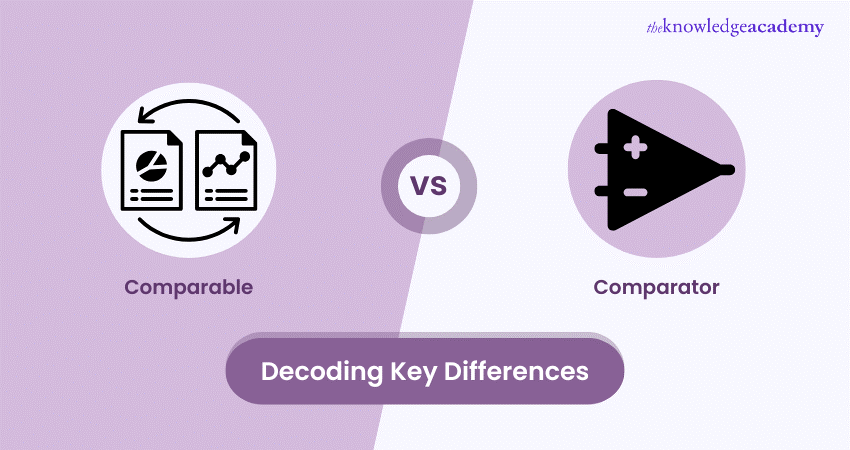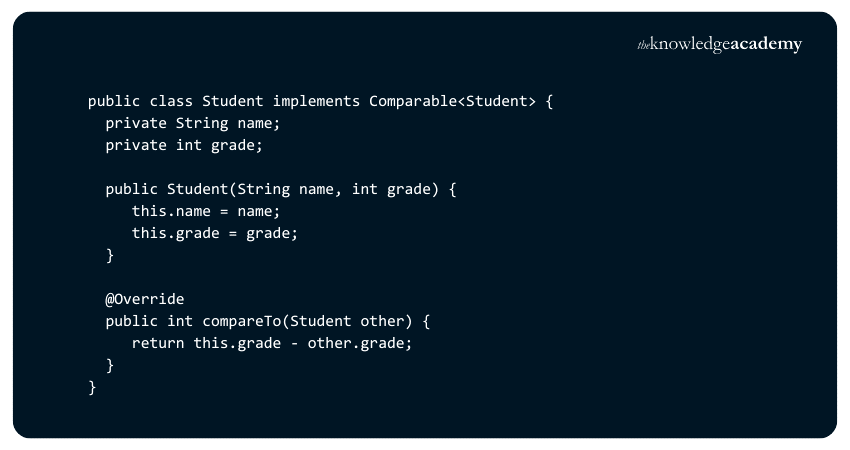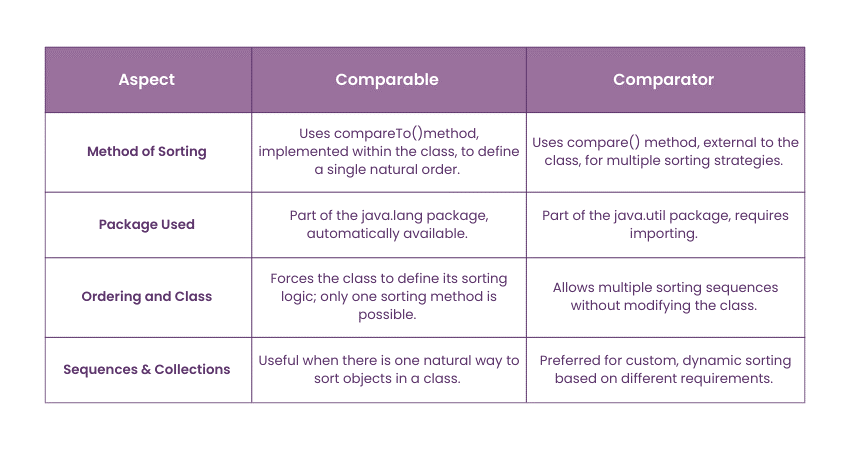We may not have the course you’re looking for. If you enquire or give us a call on +1 6474932992 and speak to our training experts, we may still be able to help with your training requirements.
Training Outcomes Within Your Budget!
We ensure quality, budget-alignment, and timely delivery by our expert instructors.

In Java programming, efficient object sorting, and comparison are crucial for smooth performance. This is where Comparable and Comparator interfaces step in. But how do they differ, and when should you use each? Let’s explore the key differences between Comparable vs Comparator to make your Java programming more efficient and streamlined.
Table of Contents
1) Comparable and Comparator: An Overview
2) What is Comparable?
3) What is Comparator?
4) Comparable vs Comparator
5) When to use a Comparator in Java?
6) When to use Comparable in Java?
7) When to use a Comparable and Comparator Interface in Java?
8) Essential Tips for Using Comparable and Comparator in Java
9) Conclusion
Comparable and Comparator: An Overview
In Java, both the Comparable and Comparator interfaces are used to compare objects for sorting, but they operate differently. Comparable provides a natural ordering for objects by implementing the compareTo() method within the class itself. This allows objects to be sorted consistently based on a single criterion.
On the other hand, Comparator offers more flexibility, enabling custom sorting logic outside the class using the compare() method. Sorting objects differently without altering the class structure is beneficial. By understanding the distinctions between Comparable and Comparator, developers can efficiently manage object comparison in Java, ensuring optimal sorting based on their needs.
What is Comparable?
Comparable is an interface in Java that defines the natural order of objects by implementing the compareTo() method. When a class implements Comparable, it forces the class to determine how its objects should be compared, typically for sorting purposes. The compareTo() method gives back a positive integer, zero, or a negative integer depending on whether the object is less than, equal to, or greater than the object.
This interface is handy when a class needs to provide a single default sorting logic, such as sorting by name, date, or numeric values. Comparable is commonly used in sorting collections like lists or arrays, ensuring consistent and straightforward ordering without needing external comparators
Comparable Example

In this example, students are ordered based on their grades. The compareTo() method ensures that the list of students will be sorted in ascending order by grade.
What is Comparator?
Comparator is a Java interface that compares two objects for sorting, providing greater flexibility than Comparable. Unlike Comparable, which defines a single natural ordering within the class, Comparator allows you to create custom sorting logic outside the class using the compare() method.
This is useful when you want to sort objects by multiple criteria, such as sorting by name, age, or date in different scenarios without modifying the class itself. You can create various Comparator instances to handle sorting orders for the same object. Comparator is commonly used in scenarios where the natural ordering of objects isn't sufficient or when external sorting logic is required, enabling more dynamic and reusable sorting strategies.
Kickstart your coding journey with our JavaScript for Beginners Training. Sign up now!
Comparator Example

Here, Comparator is used to sort Student objects by name. You can create different comparators to sort by fields, such as name, grade, or age, without altering the student class.
Comparable vs Comparator
Now that we understand both interfaces let’s examine their key differences and when to use each:

Method of Sorting
Comparable uses the compareTo() method, implemented within the class, to define a single natural sorting order. On the other hand, the Comparator uses the compare() method, external to the class, allowing for multiple sorting strategies without changing the class definition.
Package Used
Comparable is part of the java.lang package, which means it is automatically available to every Java program. Comparator belongs to the Java.util package, which needs to be imported.
Ordering and Class
Comparable forces the class to define its sorting logic. Thus, only one sorting method is possible. Comparator allows multiple sorting sequences and does not modify the original class, which means you can define several comparison logics outside the class.
Sequences and Collections
When working with sequences and collections, Comparable is useful when a class should have only one way of sorting its objects. A comparator is preferred for custom, dynamic sorting strategies that vary depending on the requirements.
Streamline your Database Management with our expert-led Hibernate Training - Join now!
When to use a Comparator in Java?
Use Comparator in Java when implementing custom sorting logic independent of the class definition. It is ideal to sort objects in multiple ways, such as by name, date, or other attributes. Unlike Comparable, which restricts sorting to a single natural order, Comparator allows for flexible and dynamic comparisons by defining the compare() method outside the class.
It is beneficial when the class doesn’t implement Comparable or when you cannot modify the class but still need to apply sorting. Additionally, Comparator helps sort collections in various ways based on specific requirements, making it a powerful tool for more complex sorting operations.
When to use Comparable in Java?
Use Comparable in Java when you want a class to define its natural order for sorting objects. This is particularly useful when a single, consistent sorting method is required for a class, such as ordering by name, age, or ID. By implementing the compareTo() method, Comparable allows objects to be automatically sorted in collections like lists or arrays.
It is a good choice when the class itself dictates the sorting logic and when the comparison criteria won’t change frequently. Comparable is simple to implement and works well when you have control over the class design, making it ideal for objects needing a default, natural order that doesn’t require external comparators.
When to use a Comparable and Comparator Interface in Java?
When you encounter a situation where a class needs to have a default sorting order while still requiring the flexibility to sort in multiple ways, it is best to use both Comparable and Comparator. You can establish a default sorting order by implementing the Comparable interface in the class.
Additionally, you can write separate Comparator implementations to handle alternative sorting orders, providing the needed flexibility. This approach allows the class to support sorting in various ways while maintaining a default sorting order.
Essential Tips for Using Comparable and Comparator in Java
When working with Comparable and Comparator in Java, it's essential to understand their proper usage to ensure efficient object comparison and sorting. Here are some key pointers to help you apply these interfaces effectively in your Java programs.
1) Use Comparable when your class has a natural, fixed sorting order.
2) Use Comparator for flexible, custom sorting without altering the class.
3) If both are required, ensure the class implements Comparable for default sorting and use Comparator for alternative comparisons.
4) Implement both interfaces carefully for optimal performance, especially when using collections like trees or heaps.
5) Avoid overcomplicating the compareTo() method in Comparable; keep it focused on one sorting field.
6) Remember that Comparator allows you to chain multiple comparison logics using Java 8's thenComparing() method.
Conclusion
Understanding Comparable vs Comparator is critical to writing efficient Java programs. While Comparable offers natural ordering within a class, Comparator provides flexibility with custom sorting logic. Knowing when to use each interface ensures smoother programming and more dynamic, reusable code. Mastering these concepts will enhance your ability to handle complex sorting tasks in Java.
Unlock the power of enterprise applications with our Introduction to Java EE Training Course!
Frequently Asked Questions

Comparable defines a single natural object sorting order by implementing compareTo() within the class. The Comparator allows for multiple sorting orders, implemented externally via the compare() method.

A class can implement Comparable to provide natural ordering, while a Comparator can define alternate sorting strategies without altering the original class logic.

The Knowledge Academy takes global learning to new heights, offering over 30,000 online courses across 490+ locations in 220 countries. This expansive reach ensures accessibility and convenience for learners worldwide.
Alongside our diverse Online Course Catalogue, encompassing 19 major categories, we go the extra mile by providing a plethora of free educational Online Resources like News updates, Blogs, videos, webinars, and interview questions. Tailoring learning experiences further, professionals can maximise value with customisable Course Bundles of TKA

The Knowledge Academy’s Knowledge Pass, a prepaid voucher, adds another layer of flexibility, allowing course bookings over a 12-month period. Join us on a journey where education knows no bounds.

The Knowledge Academy offers various Java Courses, including the Java Programming Course, JavaScript for Beginners Course and Hibernate Training. These courses cater to different skill levels, providing comprehensive insights into Super Keyword in Java.
Our Programming & DevOps Blogs cover a range of topics related to Java, offering valuable resources, best practices, and industry insights. Whether you are a beginner or looking to advance your Programming Skills, The Knowledge Academy's diverse courses and informative blogs have got you covered.
Upcoming Programming & DevOps Resources Batches & Dates
Date
 Java Programming
Java Programming
Mon 13th Jan 2025
Mon 10th Mar 2025
Mon 19th May 2025
Mon 21st Jul 2025
Mon 15th Sep 2025
Mon 17th Nov 2025
Mon 15th Dec 2025







 Top Rated Course
Top Rated Course



 If you wish to make any changes to your course, please
If you wish to make any changes to your course, please


